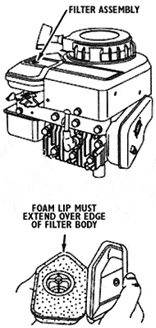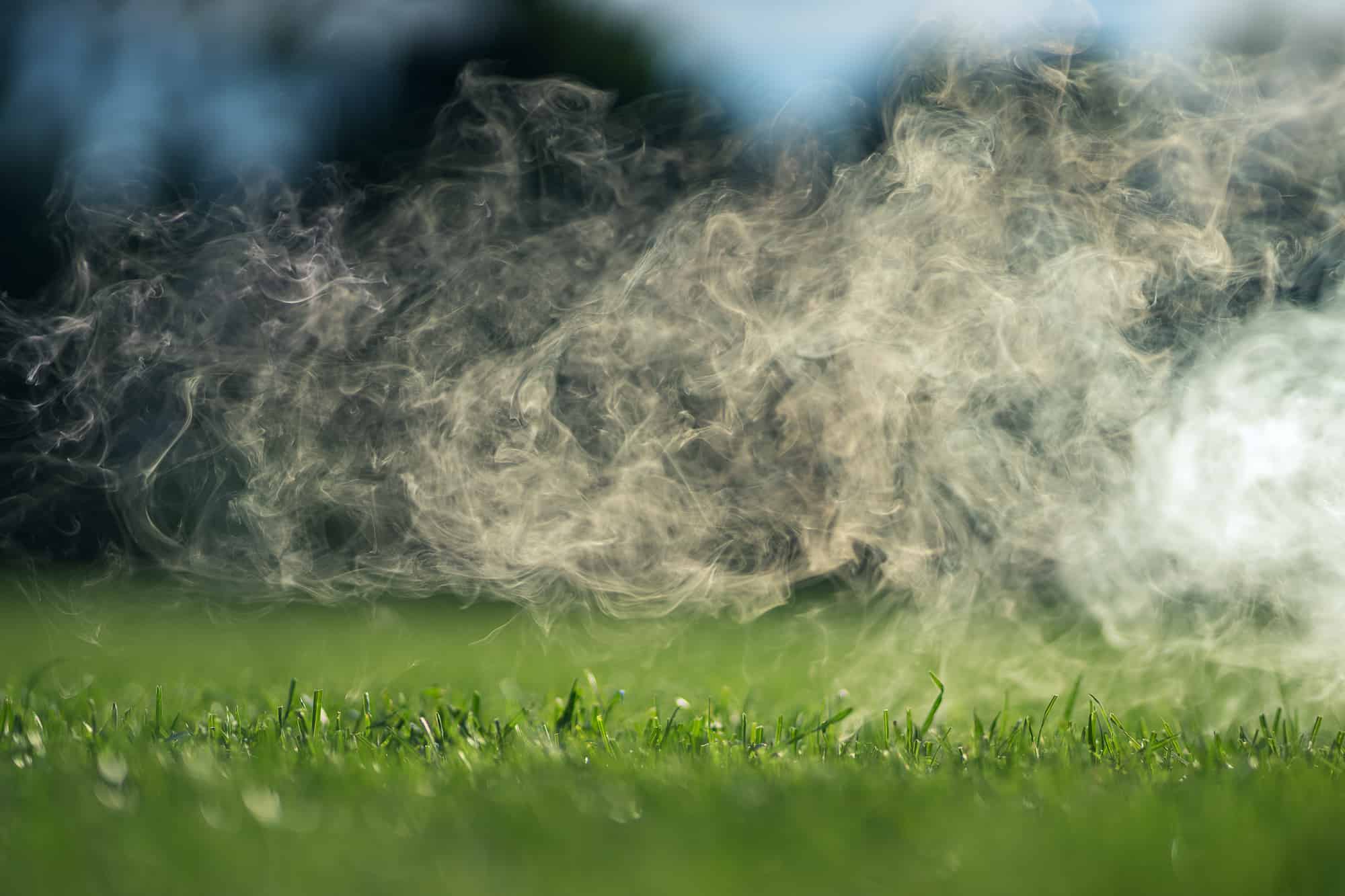In good working order, a lawnmower controls the power of combustion to provide a fantastic tool for conquering grass. In fact, I don’t need to convince anyone of its usefulness —a lawnmower is a mainstay in any garage.
However, when small engines aren’t working correctly, they really let you know about it. If you’re like me, you’re well-acquainted with the plumes of smoke emitted from 4-cycle engines.
But what do those plumes of smoke mean?
We’ll go through each and help you troubleshoot what’s going wrong with your lawnmower. Without further ado, here are the main reasons why lawnmowers blow different types of smoke.
First, we’re going to explore why lawnmowers can blow out black smoke. You might think it’s similar to our guide on patio heaters blowing black smoke, but unfortunately things are a bit more complicated than that.
Black Lawnmower Smoke
There are three main reasons why your lawnmower could be blowing out black smoke.
- The gasoline to air ratio is too rich. This indicates too much gasoline is pumped into the cylinders.
- Oil has been incorrectly dispensed into the cylinders and is being burnt as fuel.
- The air filter is not working properly, causing dust or other debris to be combusted.
As an astute reader, you’re probably wondering which of these issues is causing your black smoke problem. To verify which issue you’re experiencing, here is what we’ll need to determine.
Verify whether your choke is open
Unless your lawnmower has a fuel injector, it probably has a choke.
The choke restricts the airflow to the carburetor, which in turn mixes the air and fuel before passing the mixture to the engine. It’s primarily useful as a way to get the engine running from rest, when the energy demands are much higher.
With the choke closed, the mixture has a denser concentration of gasoline. This increases the amount of energy that the engine has to capture and can cause rattling, noise, and black smoke.
If your lawnmower runs fine otherwise, double check that your choke is open. This may be the only thing necessary to solve your black smoke issue!
Check your air filter for damage or clogs
So, your choke is open but your lawnmower is still blowing black smoke?
The next thing to check is the air filter — it may have unseen damage or clogs. Follow your manufacturer’s guide on how to replace your air filter. Here’s an example for Briggs & Stratton engines.

If there are clogs, the reduced airflow can cause the same problem that we examined above with closed chokes. The mixture of fuel / air reaching the engine contains too much fuel and not enough air.
If there aren’t clogs or obvious damage, the problem most likely lies in the carburetor itself.
Check your carburetor
If you’ve made it this far, prepare to get your hands dirty or hire some outside help to assist you. However, I would encourage you to try to diagnose the issue yourself before taking the mower to a small engine specialist.
With that being said, the first thing you can try is to adjust your carburetor.
There are usually two adjustment screws on top of the carburetor. One of these screws controls the RPM speed at idle and the other will tweak the ratio of air to fuel.
In addition to watching the video above, try to find your mower’s user manual and locate a diagram for which screw is which. This will potentially save you a headache later on.
If adjustments don’t work, you can also try cleaning your carburetor.
This is typically a solution for mowers not starting at all, but it’s not unheard of to have gunk impeding airflow from the intake (again causing the fuel mixture to skew toward having more gasoline).
Blue / White Lawnmower Smoke
Unlike black smoke, blue and white lawnmower smoke typically means one thing: you’re burning oil. The only question to answer next is why your lawnmower is burning oil.
There are many possibilities for why this happened. In no particular order, here they are.
- You might have used oil not rated properly for your engine.
- At some point, you may have blown your head gasket.
- Your O-rings / cylinder degraded and are leaking. This often accompanies leaking oil.
- The engine ran at greater than a 15 degree angle, causing oil to move into areas it shouldn’t be.
- You turned your mower upside down (even briefly) to work on it or sharpen the blades.
- You have overfilled the crankcase with oil.
- The crankcase breather is non-functional.
So, with so many different possibilities, how do you confidently diagnose the problem?
First things first — check and/or replace your engine oil. This is an easy bit of maintenance that removes a few different possibilities at once. Not to mention, it’s probably something you’ve been meaning to do for a while anyway!
Changing the engine oil first will ensure that you’ve drained all of the existing oil, that you’ve replaced it with properly graded oil, and that the crankcase has not been overfilled.
If you’ve never changed your lawnmower’s oil before, check out this wonderful YouTube video.
Is your engine still smoking? If so, check to see if you’ve blown a head gasket.
At this point, you’ve ran through everything I know to try to diagnose. If the problem persists, consider taking your mower into the shop and have a licensed small engine repairperson take a look.
Alternatively, you could purchase a new model (although I’m of the mindset that you should always try to repair first).
White Lawnmower Smoke
There’s one thing not mentioned above that is unique to engines that are blowing white smoke.
Condensation can often build in the engine’s exhaust on damp mornings. As the engine runs, the heat will turn this condensation into simple run-of-the-mill steam.
If this is the case, running the mower for a while should completely fix the issue.
However, I wouldn’t start with this assumption. Running a small engine with any of the problems mentioned above can cause damage to the engine (and be dangerous for bystanders).
Electric Lawnmower Smoke
If your electric lawnmower is smoking, this indicates that something is majorly wrong! Most typically, the motor itself burned out and needs to be replaced/discarded.
However, more rare (and more severe), there is a problem with the battery. This can release a lot of energy quickly and should be taken very seriously.
Because of the possibility for a battery explosion, you should immediately do the following:
- If the lawnmower is still plugged into the wall, unplug it (if safe).
- Grab a fire extinguisher and douse the machine with the extinguisher’s contents. Be sure to get it inside the vents.
- Move the electric lawnmower away from anything flammable, preferably to an open-air space.
One final thing to note — it’s also possible that the electric motor belt has simply gotten too hot. If you’re mowing particularly thick grass, this can happen.
Safety First
I hope it goes without saying, but — often where there’s smoke, there’s fire.
Because of this, take care when diagnosing your issues and make sure you follow proper safety precautions.
Our guide on gas generator safety is a decent place to start. However, if you don’t want to read that, at least have a fire extinguisher ready (at a minimum).
Additionally, don’t be afraid to call the fire department if it ever looks like things are going to get out of your control. You don’t want to cause damage to person or property because you’re too proud to call for help!

